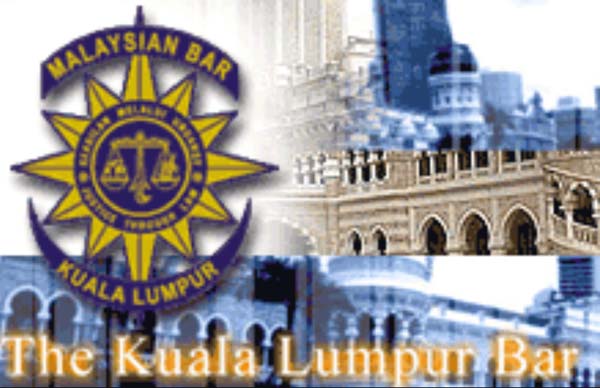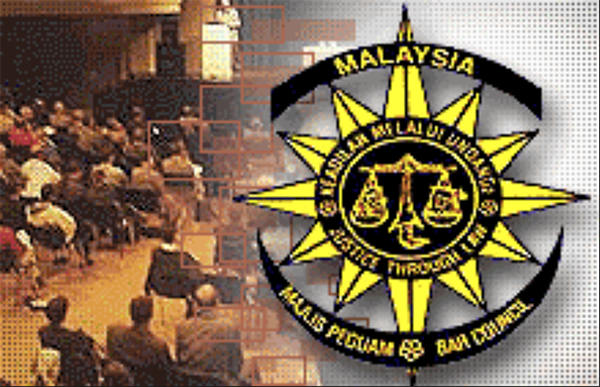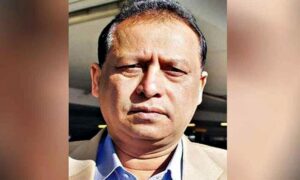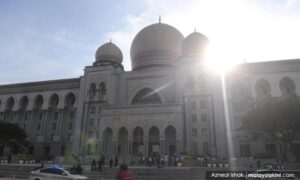By Arfaeza A. Aziz | Malaysiakini
Twenty-five years after the Malaysian Bar first passed a resolution condemning a legal provision which disqualifies junior lawyers and politicians from being elected into the Bar Council, a serious effort is finally being made to remove the clause.

On Sept 5, the Kuala Lumpur Bar Committee will launch a campaign to get backing from lawyers and the public to have section 46A dropped from the Legal Profession Act 1976 (LPA) on the grounds that it is unconstitutional.
The LPA controls the activities of lawyers and regulates the Bar Council, the 36-member body which manages the affairs and executes the functions of the Malaysian Bar.
Section 46A of the LPA bars lawyers with less than seven years’ experience, members of Parliament, state assembly representatives, and office-bearers in trades union and political parties from being elected as Bar Council members.
Young Lawyers Committee secretary Edmund Bon told Malaysiakini that the “Repeal Section 46A” campaign will kick off with a planned nationwide roadshow on the history and struggle of the Malaysian Bar. Each state Bar committee is allowed to focus on related issues.

He said the KL Bar’s decision to initiate the drive was based on resolutions passed by members in 1978 and again in 2002, when they had expressed strong disagreement with the restriction in section 46A.
“We stressed it then and we are saying it again that it is unconstitutional. It denies all members their rights to equality, and undermines the democratic process in administering our affairs,” he said.
“(Since) no serious effort was made earlier (to follow up on the resolutions)… we’re taking this one step further now.”
Wide dimension
He said the law is grossly unjust, especially to junior lawyers who form 75 percent of the 10,500 Bar members nationwide, but who are denied any representation in the council.
Their concern is compounded by the fact that Malaysia is the only Commonwealth country that imposes such a restriction on young lawyers.
“Just because we are young does not mean that we are not capable of running the council. I think we have proven that we are as capable as senior lawyers, if not better,” he said.
Bon stressed that the campaign will not focus only on the element of section 46A that deals with junior lawyers but also other parts such as the disqualification of politicians and trades union office-bearers from holding Bar Council positions.

“We anticipate that there will be no problem in garnering support on the junior lawyers aspect, but we feel that there might be some problems with the other parts. There are fears that politicians might misuse the Bar Council for ulterior motives,” he said.
“But I think this fear should not supersede the issue of independence. We must give all lawyers the benefit of the doubt that they are mature enough to use their voting power accordingly. (We should not be treated) like kids.”
Main activities
Conceding that the council had adopted contradictory stands on the legal provision in the past, Bon expressed the hope that the campaign would get full support from senior lawyers and all council members.
If the provision is not removed, he said the LPA would soon be fatal to the Bar’s independence because it is currently seen as muzzling legal practitioners.
Under the campaign, the main activities will include a nationwide signature petition, submission of a memorandum to the Attorney General, and the sending of a Private Member’s Bill to Parliament.
Section 46A was included in the LPA in 1976 when it was amended by Parliament. This created a furore among lawyers, who claimed even then that section 46A violated the freedom of association as provided in the Federal Constitution.
It was reported that the government had sponsored the amendment after the Bar Council passed a resolution boycotting all trials under the Essential (Security Cases) Regulations 1975 (ESCAR).
However, the Bar has since made conflicting statements on the issue.
In August 2001, the provision was contested in court. Lawyer R Sivarasa — who is PRM vice-president — filed an application for judicial review to declare that he was not disqualified from being elected to the Bar Council — he stated that the LPA is unconstitutional.
On July 17, 2002, the Kuala Lumpur High Court dismissed the application with costs stating that it was not his fundamental right to be a member of the Bar Council.
At one stage of the case, the council itself filed an objection to Sivarasa’s application. However, as the hearing progressed, the council changed its position and stated that it was “neither supporting nor objecting (to)” the application.
Former council president Mah Weng Kwai was quoted in media reports on Aug 23, 2001 as saying that the council objected to Sivarasa’s application because “it felt its independence must always be evident to the public”.
He made a u-turn a year later. when members of the Bar passed a resolution for the second time condemning the law.



